11.06.2025
The Brainfix Series 8 - Bonus tips - part 1

Welcome to Episode Eight: Bonus tips - part 1
In the previous episodes we have learned that we can increase the success rate of change projects by focussing on SSS - make it specific, make it smooth and make it small.
But there are of course more ways to achieve this goal.
In episode 8 and 9 you get some extra bonus tips to make sure that the new behaviour will stick longer. Let’s dive in.
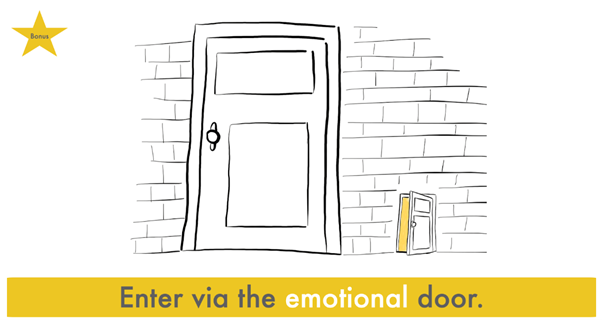
💡Bonus tip: Enter via the emotional door 🚪
In the business world, when we seek to change someone's behaviour, whether it's our employees, colleagues, or customers, we often rely heavily on rational arguments. We present facts, figures, and logical reasoning, believing that this approach will convince people to adopt new practices or ideas.
However, what if I told you that our unconscious brain is far more influenced by emotions than rational facts?
Research in neuroscience has shown that emotions play a significant role in decision-making and behaviour. Our brains are wired to respond to emotional cues, often more strongly than to logical arguments. By appealing to their emotions, you create a deeper connection and engagement. Emotions tap into our subconscious desires, fears, and aspirations, making the message more compelling and memorable. This emotional resonance is what drives real behaviour change.
So why do we often overlook the power of emotions in business? Perhaps it's because we've been conditioned to prioritise rationality and objectivity in decision-making. We believe that emotions have no place in the boardroom or the workplace.
However, ignoring emotions can be a costly mistake. Studies have shown that emotionally engaged employees are more productive, loyal, and innovative. Likewise, customers are more likely to make purchasing decisions based on how they feel about a product or brand rather than its features alone.
Instead of shouting louder with rational arguments, let's focus on creating emotional connections. Let's tell stories that inspire, motivate, and resonate with our audience. Let's acknowledge the power of emotions in driving real change, both in business and in life.
A nice example happened in Mexico where the bus company put their bus drivers on bicycles to demonstrate the risks for cyclists riding past them. I’m quite sure most bus drivers will be more careful in passing a cyclist on the street - after their experience. This had a lot more impact than giving the bus drivers rational arguments why they should be more careful. Link to the video. [16 seconds video].
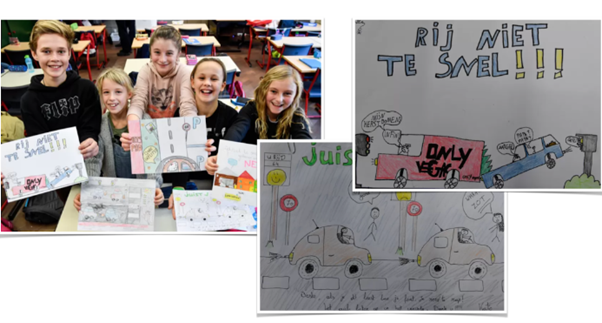
😊 The Power of Emotional Appeals in Traffic Safety 🚦
In the fight against speeding and reckless driving, some police zones are using innovative tactics to create awareness and change behaviour. One such approach involves sending speeding fines with drawings of children, aiming to touch drivers on an emotional level. These drawings humanise the consequences of speeding, evoking feelings of guilt, empathy, and responsibility.
By personalising the consequences and emphasising the dangers around schools and residential areas, these initiatives go beyond punishment to educate and raise awareness. They foster a sense of shared responsibility for road safety and encourage drivers to reflect on their actions. Ultimately, these emotional appeals prove to be effective in promoting safer driving habits and creating a more conscientious environment on the road.
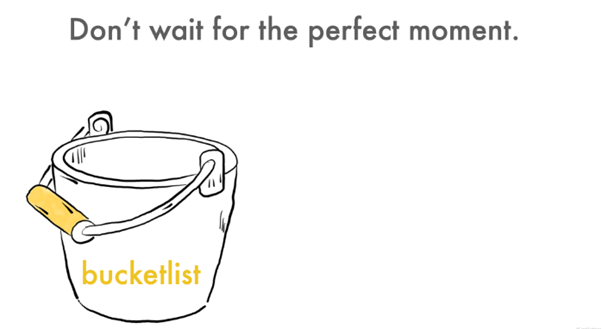
💡 Bonus tip: Don't wait for the perfect moment ⌛
It's easy to fall into the trap of waiting for the perfect moment to take action. We want everything to be just right before we dive in, analysing every detail and planning every step meticulously. However, this approach can often lead to paralysis by analysis. The truth is, you don't have to have everything figured out before you start. In fact, sometimes, over-analyzing can hold you back from making any progress at all.
Consider the concept of analysing a problem thoroughly before taking action. While it's important to understand the challenges and potential pitfalls, there comes a point where further analysis becomes counterproductive. You can get so caught up in planning that you never actually take the first step. This is where the importance of not over-analyzing comes in.
Take, for example, the idea of tackling items on your bucket list. Many people have a long list of things they want to do, but they never seem to get started. One reason for this might be that the list feels overwhelming, with each item seeming like a monumental task. However, the key is to start small. Pick one item and take the first step, no matter how small it may seem.
The important message here is to get started. Action breeds momentum, and once you're in motion, you can adapt your plan along the way. You'll quickly discover whether you're on the right path or if adjustments are needed. More often than not, you'll find that the energy and momentum you gain from taking that first step propel you forward in ways you never imagined.
So, don't wait for the perfect moment. Start now, even if your plan isn't perfect. Embrace the journey, learn as you go, and be willing to adapt along the way. Remember, the most important thing is to get moving.
As Lao Tzu said, "The journey of a thousand miles begins with one step."
So take that step today and see where it leads you.
🎯Ticking off your bucketlist ✔️
Let’s look at a few items that a lot of people have on their bucketlist and see how we can realise them.
🌍 Travelling the world.
It can feel overwhelming to plan such a grand adventure all at once. Instead, start small by planning two city trips for next year. Whether it's exploring nearby towns or visiting neighbouring countries, these smaller trips can ignite your passion for travel and build confidence for larger journeys.
🏃♂️ Running a marathon.
It may seem like an insurmountable goal if you're not a seasoned runner. But instead of diving straight into marathon training, start with the basics. Join a 5 km running program or sign up for a local race. Building up your endurance gradually not only makes the goal more achievable but also allows you to enjoy the journey along the way.
🏭 Embarking on the journey of starting a company.
It can feel daunting, but taking small steps can make it more manageable. Begin by networking with entrepreneurs or attending local startup events to gain insights and inspiration for your venture. Consider joining an entrepreneurial course or workshop to develop essential skills and knowledge, and take a small step by conducting market research or drafting a business plan to clarify your ideas and goals.
💘 And if you are thinking about getting a tattoo, just starting with a temporary stick-on tattoo might be a good idea 🤣
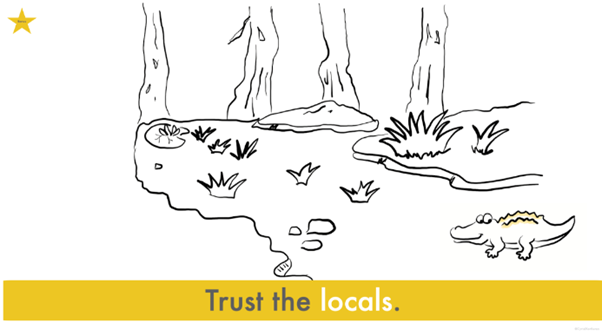
💡 Bonus tip: trust the locals 🧑🤝🧑
In the realm of organisational change, there's a common misconception that management must control every aspect to ensure success.
However, sometimes the most effective approach is to trust the locals - your employees - to make more specific decisions and drive valuable actions. Many companies aim to be more client-centric, but instead of dictating what employees should do, it may be more beneficial to let them decide how to make this a reality.
Client-centricity can vary significantly from one department to another. What's valuable for the sales team may not align with the needs of the accounting department. Just as when we travel to a different country and trust locals for recommendations, businesses should trust their employees - the "locals" of their respective departments - to make informed decisions.
An employee understands the nuances and intricacies of their department better than anyone else, even more so than management. They are the ones interacting directly with clients, dealing with day-to-day operations, and understanding the specific challenges and opportunities within their domain. Therefore, empowering them to take ownership of decisions can lead to more tailored and effective solutions.
By fostering a culture of trust and autonomy, organisations can tap into the expertise and creativity of their employees. Instead of top-down directives, encourage bottom-up innovation and problem-solving. Provide guidance and support, but allow employees the flexibility to adapt strategies to suit their unique circumstances.
In doing so, businesses can leverage the collective wisdom of their workforce to drive meaningful change and better serve their clients. Trusting the locals - your employees - can lead to more agile, responsive, and ultimately successful organisations. After all, who better to navigate the terrain of change than those who know it best?
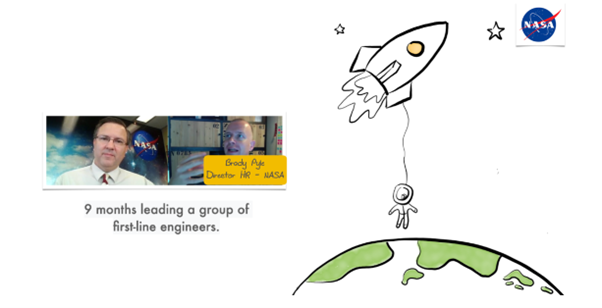
🔗Bridging the Gap: Lessons from an HR Director's Journey 👩💼
I had the chance to interview an HR director from NASA who shared a valuable lesson from his career. After years in his role, he felt a growing disconnect and decided to take action. As an experiment, he left his position to lead a small team of first-line engineers facing various challenges.
During this time, he discovered two key insights. Firstly, he realised that many decisions made by top management never reached the employees on the ground. Instructions were given without context, leaving workers in the dark about the reasons behind certain directives. This lack of communication stemmed from the layers of hierarchy within the organisation.
Secondly, he observed that the people on the workfloor possessed a wealth of experience and valuable insights that were often overlooked by management. They faced challenges daily and had practical solutions to offer, but these ideas rarely made it to the top.
Now back in a director position, he prioritises communication and consultation with the workfloor for most decisions. By involving employees in the process, decisions are more informed and better received. Additionally, he actively listens to frontline workers, recognizing their expertise and incorporating their ideas into decision-making.
This shift has strengthened communication, collaboration, and problem-solving within the organisation. It serves as a reminder of the importance of staying connected to the workforce and valuing their insights for meaningful change.
Hope these tips inspire you and stick around!
See you in the next chapter for some more insights and tips!
Cheers,
Nic (aka Cyriel)
====
Hi, I’m Cyriel - international speaker on 'Making Change Simple'
Change is constant and often scary, but it doesn’t have to be. I bring a simple perspective to help leaders and teams tackle change confidently. Through practical insights, interaction, and humor in my keynotes, you can turn the fear of change into opportunity.
Don’t mind the change. Change your mind.

